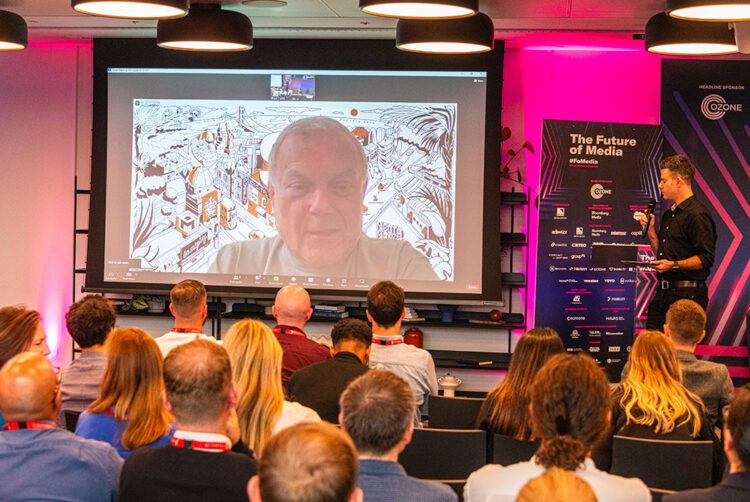The wrong elephant

Opinion: 100% Media 0% Nonsense
Barely anyone wanted to talk about AI at The Future of Media. But how media is traded, and the seemingly intractable problems that have built up over time, was a constant concern.
Here’s the thing about opinion and analysis: we’re often wrong. As a journalist I’m wrong all the time: sometimes my predictions don’t turn out to be true, sometimes I misunderstand the issues, and sometimes my heart (or my ego) clouds my judgment.
But here’s the other thing: being wrong doesn’t have to be a big deal. If we’re transparent and honest about why we got something wrong and how to learn from it, we should do a much better job of getting it right more often.
Last week I was expecting our flagship The Future of Media event to be full of soul-searching, evangelising and perhaps even a bit of fearmongering about the impact of artificial intelligence on advertising and media. I went so far as to suggest that AI would be the “elephant in the room”.
One attendee was, they confided, disappointed to not see a physical elephant standing in the corner of our venue in the City of London.
Predicting AI as a talking point didn’t feel that bold, given the volume of discussion at the larger industry events this year like Cannes Lions, Advertising Week Europe, or across this publication over the last year. As I referenced last week, the impact that AI hype (as well as some necessary cost-cutting) has had on the share prices of Big Tech over the last 18 months has been extraordinary.
However, as I revealed in my end-of-week review newsletter on Friday, the way media is traded and the advertiser/agency relationship seemed to come up more often when industry leaders were asked to assess the big challenges.
Short-termism
This was not an exact science. I strongly suspect the conversation was impacted by the WFA/Mediasense report published just before The Future of Media that revealed how unhappy a majority of advertisers are with their agency relationship.
Frankly, the issue is also self-selecting. The Future of Media attracts a very high-level of C-suite decision-makers at UK agencies and media owners — no wonder, then, that they are preoccupied with ‘how the money is made’ as opposed to longer-term issues such as sustainability, diversity or equity.
We will publish write-ups, podcast episodes and video clips from the whole two days of discussion at The Future of Media to ensure the full range of views are being promoted. I’m particularly excited to review the Future100 sessions on Day 2, in which the industry’s rising stars offered a wide variety of perspectives about not just how to make this industry work better in 2024, but in 2030 and beyond.
Trading places
There were some that argued that there is an urgent need to break up big media-agency groups. The current landscape is plagued by issues such as limited inventory and the overwhelming desire for agencies to profit at any cost. The WFA/Mediasense survey showed that only 24% of advertisers believe their media agencies are “fit for future purpose” or adequately evolving.
I asked Sir Martin Sorrell, the WPP founder who left five years ago to launch S4 Capital, what he would have done differently if he was still at the WPP helm. Essentially, Sir Martin called for WPP and other big holding companies to be dismantled — the reality is that agencies are shifting towards analytics and data, but their primary focus remains on trading. Their business model prioritises short-term gains over long-term growth, hindering their ability to adapt.
However, advertisers also bear responsibility for the current state of affairs. They demand more from their media agencies while pressuring them to secure cheaper media prices. Both parties are trapped in a 20th-century business model that no longer aligns with the evolving industry landscape.
“Both the buy-side and the sell-side have feet of clay and are accusing the other of being too slow to change,” one industry sage remarked after listening to my interview with Sir Martin.
The core issue lies in procurement practices, which perpetuate the status quo. Many agencies rely on media auditing as a safety net, hindering progress and innovation. Breaking free from these deeply ingrained practices is a complex task that requires concerted effort from all stakeholders.
While some may disagree, it is undeniable that change is necessary. Conversations with industry experts and insiders reveal a shared understanding of the need to break up big media-agency groups. Agencies, they argue, have become overly reliant on outdated practices. It is crucial to wean them off their comfort blanket and embrace a new way forward.
The issues surrounding big media-agency groups extend far beyond what can be covered here. However, it is clear that their current structure hampers progress and innovation. Breaking up these groups is a bold step towards creating a more agile and adaptive industry that is better equipped to meet the evolving needs of advertisers and consumers alike.
And yet…
Oh, and one more thing — a large chunk of this article was written with the assistance of an AI tool. I literally took some notes from a conversation I had about content from the event and asked a chatbot to turn it into an opinion piece.
We might not have much to say about AI right now, but we have to admit that it’s everywhere and its impact on how we work in media is real. We will automate, create and compete on the basis of how well we use AI, and in the long-term, as I warned last week, media owners need to get real about AI platforms are built using their content as training data.
Perhaps I was thinking too small to suggest AI should be compared to an elephant in a room. Maybe we need to start thinking of it as the room itself.
 Omar Oakes is editor-in-chief of The Media Leader and leads the publication’s TV coverage.
Omar Oakes is editor-in-chief of The Media Leader and leads the publication’s TV coverage.
‘100% Media 0% Nonsense’ is a weekly column about the state of media and advertising. Make sure you sign up to our daily newsletter to get this column in your inbox every Monday.




